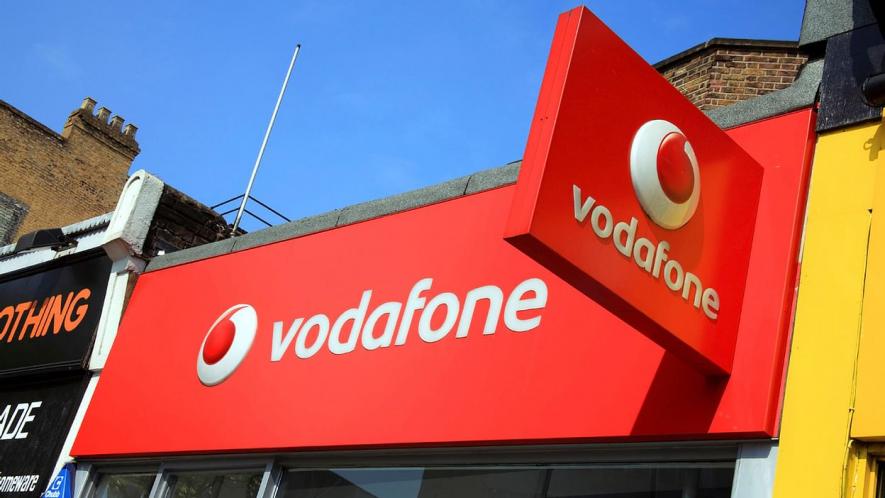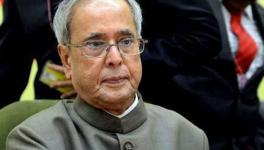Colonial Legacy at Heart of Vodafone Arbitration

Image Courtesy: The Quint
Bengaluru/Gurugram: In April 2017, one of the authors of this article met the then President of India, Pranab Mukherjee, in Rashtrapati Bhavan in New Delhi. The purpose of the meeting was to ask him a question for a book that was published by Penguin Random House later that year titled, Thin Dividing Line: India, Mauritius and Global Illicit Financial Flows, authored by Paranjoy Guha Thakurta with Shinzani Jain.
At the meeting over tea and snacks in ornate cutlery, the discussion moved to a decision taken five years earlier when Mukherjee was India’s Finance Minister. He had taken an important decision that was tucked into the fine print of the Finance Bill that was part of the Union Budget for 2012-13. The decision was to retrospectively amend the Income Tax Act, effectively overturning a decision of the Supreme Court in order to ensure that the government of India could levy and receive tax on the acquisition of Hutch, an Indian telecommunications company, by the United Kingdom’s Vodafone.
The question came up: Had he sought the prior consent of then Prime Minister Manmohan Singh before inserting the retrospective amendment to the Act?
Mukherjee’s calm demeanour suddenly changed. His eyes flared as he shot back with a vehemence that seemed to indicate that one should not have the impunity to ask him such a question. He said his response could be quoted but without attribution, a confidence that was maintained till his passing on August 31, 2020. He said: “No one will ever get to know what transpired between the Prime Minister and the Finance Minister. The secret will go with me.”
The retrospective amendment had inserted provisions in the Income Tax Act, clarifying that as far as India’s tax authorities were concerned, the government is owed capital gains tax for every transaction that concerns assets located in India, even if the actual transaction takes place outside India’s territorial jurisdiction, and even if none of the transacting parties are Indian entities.
This amendment followed the Supreme Court ruling in January 2012 that since the acquisition by Vodafone of the assets of Hutch in India was effected through a transfer of ownership stake in a Cayman Islands-based entity between a Dutch subsidiary of Vodafone and a Hong Kong subsidiary of Hutch, the transaction was outside the territorial jurisdiction of India’s tax authorities and could not be subjected to capital gains tax by the revenue authorities of the Ministry of Finance here.
The retrospective amendment was widely criticised in business circles and the financial press on the ground that it had vitiated the atmosphere for smooth inflows of foreign direct investment to India. Successive Finance Ministers of different political hues (including Palaniappan Chidambaram and Arun Jaitley) too expressed their reservations about Mukherjee’s decision.
Ruling at The Hague
On September 25, the Permanent Court of Arbitration at The Hague ruled that India had violated its commitments under a bilateral investment treaty with The Netherlands to ensure “fair and equitable treatment” of Vodafone, and may not proceed with its tax claim.
While the Finance Ministry stated in its response that it “will consider all options and take a decision on further course of action, including legal remedies before appropriate fora,” the ruling has generated a range of responses. Many commentators and editorials in the business media have argued that India should “gracefully” accept the arbitration award and cease its efforts to tax Vodafone, in the interest of maintaining investor confidence in the country. A contrary view was expressed by former Additional Solicitor General (ASG) Bishwajit Bhattacharya, who has forcefully argued that India is entitled to pursue its claim.
The only point on which there appears to be a consensus is that the arbitration award is unlikely to be the last word in the eight-year-long tax saga. There remains in the public conversation, however, a significant gap in understanding the fundamental questions that are at stake in the issue.
While the complete judgement is not publicly available, as both parties to the arbitration have mutually consented to keeping it confidential (according to an article by Ashish Goel and Shilpa Goel in the international taxation journal, Tax Notes International), the “operative” portion of the judgment of the arbitration tribunal has been circulated in the press. It states that the retrospective amendment constituted a failure on India’s part to ensure “fair and equitable treatment” for Vodafone, which is a legal standard incorporated in India’s bilateral investment treaty with The Netherlands.
Much analysis has centred around the issue of whether taxation should be excluded from the remit of international arbitration (which is the position of the government of India). This is, in effect, asking whether the legal doctrine under which India’s actions have been deemed a violation of the treaty should be applicable to the subject matter – namely, taxation. However, little attention has been devoted to the legal doctrine itself – the “fair and equitable treatment” standard incorporated in the treaty.
Origins of “Fair and Equitable” Standard
Looking closer at the history of the doctrine reveals an international debate that India took no part in, that resulted in a construct rooted in the colonial philosophy of a “civilising mission” being accepted by the Indian government on behalf of the country’s people.
In 1923, a commission established to settle claims between the United States and Mexico had stated the following principle: “Facts with respect to equality of treatment of aliens and nationals may be important in determining the merits of a complaint of mistreatment of an alien. But such equality is not the ultimate test of the propriety of the acts of authorities in the light of international law. That test is, broadly speaking, whether aliens are treated according to ordinary standards of civilization.”
In effect, the commission was saying that under international law, there existed “ordinary standards of civilization” by which a sovereign government’s treatment of foreign nationals could be judged, even if the government had acted lawfully under its own laws and afforded them legal parity with its own citizens. At the time, this was an established and well settled legal doctrine in a world that was still largely divided among various European empires.
This doctrine faced a challenge a few decades later when, by the middle of the 20th century, many countries had gained their independence and sought to regain control of their national assets from their owners in the former coloniser countries. While the newly independent countries held that such foreign investors were entitled to appropriate compensation under domestic laws, the coloniser countries advanced the view that there existed a “minimum standard of treatment” of foreign nationals and their investments. The “standards of civilisation” doctrine was rephrased for a post-colonial time.
At the United Nations, the newly independent countries advanced their view through a series of resolutions passed in the General Assembly through the 1950s, 1960s and 1970s, culminating in the Declaration of the Establishment of a New International Economic Order in 1972 and the 1974 Charter of Economic Rights and Duties of States. These resolutions, while passed with overwhelming majorities in the UN General Assembly, did not represent legally binding statements, and were not supported by the developed, “capital exporting” former coloniser countries.
The capital exporters followed their own strategy, developing the bilateral investment treaty as an alternative approach to sidestep the issue of countries in their former empires having taken a collective stance against the “minimum standard of treatment” doctrine. The capital exporting countries ensured that these treaties incorporated the standard into their terms, and offered the treaties to individual former colonies with the incentive that entering the treaty would boost foreign investment.
By the time India signed its first such treaty with the United Kingdom in 1994, the standard format of bilateral investment treaties had pretty much been established. Hundreds of such treaties had already been signed across the world since the late 1970s. India had largely missed the debate, having been an inward-looking economy focused on import substitution in the period that it was playing out, and uninterested in attracting foreign investment. As a result, the form of bilateral investment treaties – including their “minimum standards of treatment” doctrine – that India signed in the 1990s with a number of countries was effectively an international standard, that neither the government nor civil society in India had ever deliberated on.
The “fair and equitable” treatment that India is supposed to have denied Vodafone by seeking to tax its acquisition of Hutch is one of the components of the “minimum standards of treatment” incorporated into the India-Netherlands bilateral investment treaty.
Why Should India Not Have Right to Tax Sale of Indian Company?
In an article for the Business Standard, former ASG Bhattacharya has argued forcefully that India has every right to seek to tax the acquisition of Hutch by Vodafone.
First, he pointed out that Vodafone had sought the approval of the Indian government’s Foreign Investment Promotion Board prior to the acquisition. If the Board had the requisite territorial jurisdiction to approve the transaction, he says, how could the tax authorities have no jurisdiction? After all, both institutions were then located in the same government building – North Block in New Delhi! How could one have territorial jurisdiction and not the other?
As a result of Vodafone’s challenge, he wrote: “India’s law amended by Parliament has remained only on paper...and India has yielded to the illegal jurisdiction of international arbitration on a tax matter.” The treaty with The Netherlands excludes taxation matters from its purview of commitments made to international investors under it. “It is a settled law,” he continued, “that treaty obligations have to be in harmony with domestic legislation,” pointing out that the result of the arbitration is in violation of Indian law, and of judicial precedent.
In an article for Fortune India, analysts Mukesh Butani and Tarun Jain pointed out: “By design, and also by judicial consensus, there is neither equity in taxation nor fair play in tax law, the sole purpose of which is to impose an exaction on the subject under the sovereign’s prerogative.” They asked whether the conclusion of the arbitration panel that for investors covered under the investment treaty the government has conceded sovereign and legislative authority to impose any additional tax after an investment, is correct?
Further, they pointed out that there are “examples galore where Parliament has retrospectively amended the tax laws against the taxpayers with clear judicial authority that such amendments are valid and enforceable to revive judicially scuttled tax demands, given the mandate under the Constitution.” Why should this not apply in Vodafone’s case too? The government may approach Indian courts on this question, they suggested.
Three questions remain to be answered.
·Will the Indian government appeal the award at the High Court of Singapore (the legal seat of the arbitration)?
·Will Vodafone seek to enforce the arbitration either by approaching an Indian court or a foreign court?
·Will the Indian government approach an Indian court seeking to defend its sovereign prerogative?
The context in the telecommunications industry is also an inescapable factor in the government’s calculus – until a few weeks ago, the government was trying to secure more time for Vodafone and Airtel to pay thousands of crores in dues before the Supreme Court, in order to ensure competition in the sector dominated by Reliance Jio, owned by India’s richest man, Mukesh Ambani. However, a larger question remains.
Can India Challenge the “Minimum Standards” Doctrine?
In recent years, international opinion, even in the developed world, has begun to turn against several aspects of the bilateral investment treaty system, particularly over arbitration as the dispute settlement mechanism. Several prominent adverse awards have created an atmosphere of distrust of the system of dispute settlement via arbitration.
For instance, in a claim brought by Occidental Petroleum Corporation against Ecuador, under its treaty with the United States, a tribunal awarded the company $2.3 billion in compensation despite acknowledging that the company had broken Ecuadorian law.
Increasingly, public policy measures to protect the environment, or to protect public health, or to protect against economic instability result in arbitration claims being made against the governments concerned.
Argentina’s efforts to stabilise and control prices in the face of runaway inflation in 2001-02 resulted in no less than 40 arbitration claims being brought against it.
More recently, Philip Morris, the international cigarette manufacturer, brought claims against Australia and Uruguay over their anti-smoking efforts, including laws mandating plain packaging and on warning labels.
The response to this situation has been growing denunciation of the dispute settlement mechanism in international fora and its abandonment by some countries. Critics have argued that the system enables unelected, unaccountable tribunals, comprising corporate lawyers, to adjudicate and issue orders that cannot be appealed, on what are essentially matters of public policy. Several countries, including Australia, Ecuador, South Africa and Indonesia, have announced that they would no longer include dispute settlement through arbitration clauses in future treaties, or that they would withdraw from current treaties, or let such treaties lapse.
India, too, has gone down a similar route. In 2015, the government released a new model bilateral investment treaty, dropping several aspects of the “minimum standards of treatment” doctrine including the “fair and equitable treatment” standard, and excluding taxation measures by the government from the treaty provisions. Since then, India has cancelled a majority of its bilateral investment treaties, and has sought to renegotiate them. On the remaining treaties that India is still party to, it has sought to sign “joint interpretive statements” with the partner nations in order to bring them in line with India’s new model treaty.
The Vodafone case, however, presents an opportunity for the debate to be revisited, particularly by India’s vibrant civil society, at a more fundamental level. With more and more industrial sectors being liberalised by the government, there is no doubt that ensuring enabling conditions for foreign investment is crucial. However, does India need to continue to adhere to a standard based on the colonial “civilising mission” in order to do so?
The authors are independent journalists.
Get the latest reports & analysis with people's perspective on Protests, movements & deep analytical videos, discussions of the current affairs in your Telegram app. Subscribe to NewsClick's Telegram channel & get Real-Time updates on stories, as they get published on our website.
























